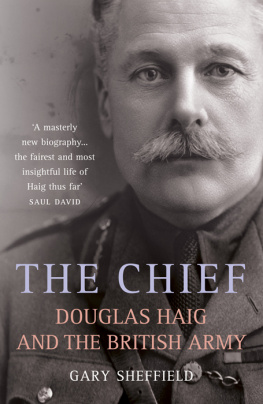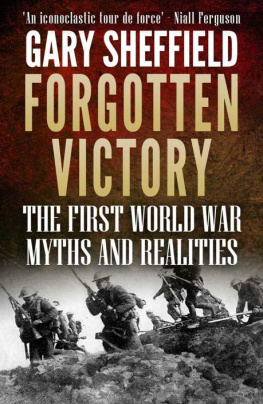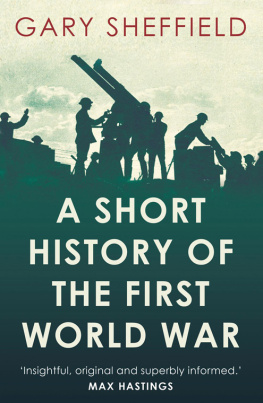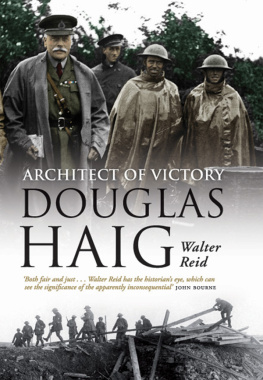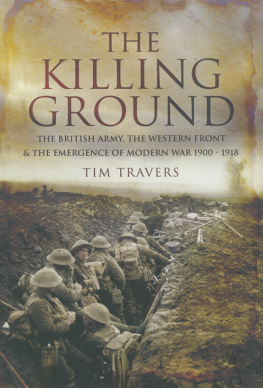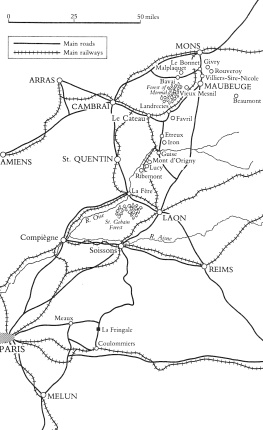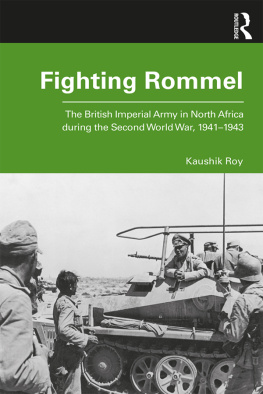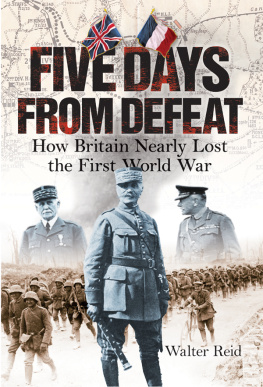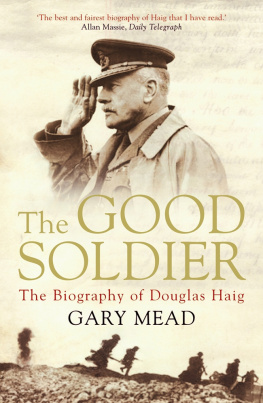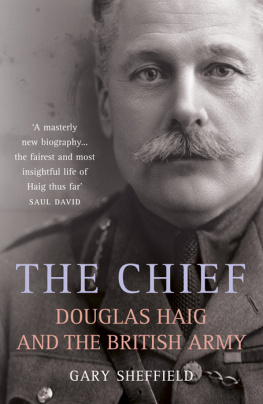For John Bourne and Peter Simkins
with thanks for friendship, support and inspiration
I would like to the thank Lord and Lady Haig, and the rest of the Haig family, especially Monica Scott and the late Douglas Scott. I would also like to put on record my gratitude to Dawyck, Second Earl Haig.
Quotations from material held in the Royal Archives appear by gracious permission of Her Majesty Queen Elizabeth II. Crown copyright material appears by kind permission of The National Archives and Commonwealth copyright material by kind permission of the Australian War Memorial.
I would like to thank the following for permission to quote from material for which they hold the copyright:
Lord Haig (Haig papers)
The Trustees of the National Library of Scotland (Haig papers)
Lord Kitchener (Kitchener papers)
Liverpool Record Office, Liverpool Libraries (17th Earl of Derby papers)
The Trustees of the Royal Green Jackets Museum (Fuller papers)
The Spectator (Strachey papers)
The Master, Fellows and Scholars of Churchill College Cambridge (Hankey Papers)
Andrew Rawlinson (Rawlinson papers)
Parliamentary Archives (Lloyd George papers)
Bodleian Library (Asquith papers)
Bovington Tank Museum (Lindsay papers)
The Syndics of Cambridge University Library (University Archives)
The Trustees of the Imperial War Museum (Wilson papers)
National Army Museum (Ellison papers)
Professor Eugene Ryan (Ryan papers)
Joint Services Command and Staff College (various papers and Montgomery-Massingberd papers)
New College Oxford (Milner papers)
The Trustees of the Liddell Hart Centre for Military Archives (Clive papers, Grant papers, Howell papers, Kiggell papers, Maurice papers)
Lord Cholmondeley (Sassoon papers)
Mrs Joanna Butler (Butler papers)
Lord Esher (Esher Papers, copyright administered by Churchill College Cambridge)
Every effort has been made to trace the copyright holders in the Price-Davies, Boraston, Hedley, and Thompson papers held in the Imperial War Museum. Both the author and the Museum would be grateful for any information as to the current copyright holders. To anyone whose copyright I have unwittingly infringed I offer my apologies and will seek to rectify the matter in later editions of this book.
One of the last, but most rewarding parts of writing a book is to complete the acknowledgements. It is a genuine pleasure to mention those people and institutions that have supported me in writing this book. Some gave me specific help, and others have contributed to the development of my understanding of the British army in the First World War, and the role of Douglas Haig, over many years. Yet others have simply been kind to me while I was writing the book. If I named them all the list would be vast, so I hope any not mentioned here will forgive me.
At the head of the list are Peter Simkins and John Bourne. I have dedicated The Chief to them as a small tribute to all they have achieved as historians, and in recognition of everything they have done for me not least in discussing my ideas and reading drafts of this book. Stephen Badsey has been kindness itself, sharing unpublished work with me, reading drafts and being a sounding board for ideas. Naturally none of this distinguished trio bears any responsibility for remaining imperfections in the finished product. Saul David very kindly wrote a flattering preface and has been hugely supportive of the project; as a fellow Arsenal fan we have been suffering together in recent seasons. My colleague in the University of Birmingham War Studies project Peter Gray has been a tower of strength. Thanks are also due to Niall Barr, Jim Beach, Jonathan Boff, Brian Bond, Bob Bushaway, Jeremy Crang, Bob Foley, David French, Bryn Hammond, Simon Higgens, Spencer Jones, John Lee, Elspeth Johnstone, Spencer Jones, David Jordan, Chris McCarthy, Helen McCartney, Stuart Mitchell, Michael Orr, Bill Philpott, Andy Simpson, Michael Snape, Carolyn Sweet, William Spencer, Kathy Stevenson, the late John Terraine, Rob Thompson, Dan Todman, Ion Trewin, Tony Vines and Jamie Wilson. Two doctoral candidates at Birmingham, Ross Mahoney and Michael LoCicero, were exceptionally generous with their time in helping me with this book, both indirectly and directly.
I have learned a huge amount from my students over the years. I would especially like to thank my military students (and colleagues) on the Higher Command and Staff Course; the students on the MA in British First World Studies at the University of Birmingham; and my research students. I have benefited greatly from the knowledge and insights of members of Birmingham War Studies Seminar, the Western Front Association, of which I am proud to be a Vice-President, and the British Commission for Military History. I would also like to thank General Sir Nick Parker for inviting me to become Regimental Historian of The Rifles, and the members of the regimental family for their inspiration at many levels.
It has been a pleasure to be reminded of the worldwide community of scholars working on the British army of the First World War. The Australian team of Robin Prior and Trevor Wilson has set the agenda to a very large extent. In this book I have disagreed with some of their arguments, (and elsewhere they have disagreed with some of mine) but our disputes are always conducted with respect and affection. Also in Australia Roger Lee deserves particular thanks, not least for his excellent hospitality, along with Jeffery Grey and Peter Stanley. Thanks are also due to Steve Gower, Ashley Ekins, Craig Tibbitts and the staff at the Australian War Memorial, one of the worlds great museums and archives. I have benefited greatly from the wisdom of New Zealand historian, Chris Pugsley, currently based in the UK; and Canadian historian Tim Cook. In the USA, Jay Winter has been extremely supportive. As the book neared completion I was invited to lecture at the University of Southern Mississippi, and was able to benefit from the input of Andy Wiest, a friend for nineteen years and counting, and author of the best short biography of Haig. Andy and Jill, thank you for your hospitality.
While putting the last touches to the book I heard the sad news of the death of Richard Holmes. A very kind man, Richard had a huge and positive impact on my career, and was a fine historian of the Great War. Military history, and the lives of us who knew him, are poorer for his passing.
Of the many archivists, librarians and museum people who have helped me, I would especially like to thank Alison Metcalfe (National Library of Scotland); Pamela Clark and Allison Derrett (Royal Archives); Chris Hobson and his staff (library of Joint Services Command and Staff College); Andrew Orgill and his staff (library of Royal Military Academy Sandhurst); Simon Robbins and Rod Suddaby (Imperial War Museum); Lianne Smith (Liddell Hart Centre for Military Archives); Helen Langley (Bodleian Library); Allen Packwood and the staff of the Churchill Archives Centre; William Spencer (National Archives); and Richard Smith and his staff (Bovington Tank Museum).
The publication of this book was delayed by about a year through two factors beyond my control. One was illness, and the other one wasnt. Since 2009 I have seen publishers at their best and worst. I will draw a veil over the latter, and instead Ill confine my comments to thanking the folk at Aurum Press: it has been a pleasure to work with Graham Coster, Stuart Cooper and Barbara Phelan. Barbara Taylor produced the excellent maps. As ever, thanks are due to my literary agent, Simon Trewin, and his assistant at United Agents, Ariella Feiner. Many thanks to my research assistant, Pam Cooper.
It is no exaggeration to say that this book would not have been completed without the loving and long-suffering support of my family: my wife, Viv, to whom I owe more than I can say; my daughter and son, Jennie and James, both now young adults; my parents; and all the members of the Sheffield and Davis clans, far too numerous to mention individually. In addition I owe so much to our church family at Grove Parish Church and at the Cornerstone cafe for their support, and also to Alan and Mandy Bird, who are everything that true friends should be.
Next page
